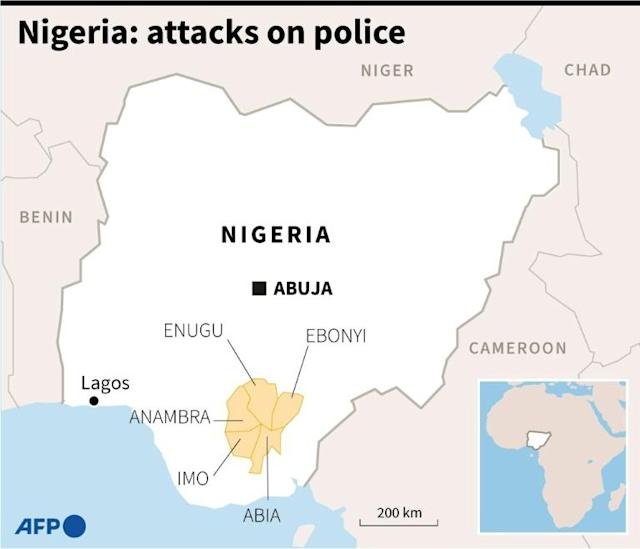Joel Olatunde AGOI – AFP
The shell of Owerri city prison has become the charred symbol of attacks that are unfurling across Nigeria’s southeast, stirring fears of renewed separatist violence and uneasy memories of a civil war half a century ago.
At least 127 police and security personnel have been killed this year in the powderkeg region and more than two dozen police stations razed, according to local media.
The assailants are often referred to simply as “unknown gunmen.”
Some officers now refuse to wear uniforms in public out of fear, police sources and residents say, while others are seeking transfers.
“Our region is under siege. Nobody is safe anymore. The gunmen can come at any time and wreak havoc on our land,” said Friday Okwor, a retired civil servant in Owerri, capital of Imo state.
In the most brazen attack, on April 5 heavily-armed men raided Owerri police headquarters and blasted their way with explosives into the main prison, freeing more than 1,800 inmates.
In a region where separatist sentiments often flare up among the indigenous Igbo, officials are pointing the finger at the outlawed Indigenous People of Biafra or IPOB that agitates for a separate state.
But the situation is far from clear.
IPOB says it is being falsely accused in a bid to divide the separatists, who are already split over strategy. Some southern leaders accuse rivals of sponsoring attacks to discredit them.
With a headcount of around 200 million, Nigeria is Africa’s most populous country, and tensions among its more than 250 ethnic groups often simmer.
But some local leaders fan ethnic embers for political gain, critics say, especially as 2023 elections approach to replace President Muhammadu Buhari.
Others accuse criminal gangs using the IPOB name as a cover. Some see a frustrated hardline wing of separatists at work.
Buhari’s government, under increasing pressure to tackle insecurity in Nigeria, has ordered a police and army operation to stop the southeastern unrest.
“We are very careful these days because of the rampant killings of our personnel,” one local police official told AFP asking not to be identified.
“Many of us no longer wear our uniforms until we get to the office.”
– Local grievances –
At least five electoral offices with ballot materials have also been burned, the latest in Akwa, Anambra state capital on Sunday.
“Almost daily attacks have turned Igboland into a theatre of war,” said local resident Vivian Okafor, using the name Igbos often employ to refer to the southeast.
“You can hardly find police on the roads anymore.”
While no group has claimed responsibility, much of the blame has fallen on IPOB, the separatist movement seeking independence for the Igbo.
IPOB has denied any involvement.
But those accusations have sharpened since a group known as Eastern Security Network or ESN, reportedly an IPOB paramilitary wing, began posting videos showing uniformed recruits drilling.
But Uchenna Madu, leader of another pro-Biafra group, the Movement for the Actualisation of the Sovereign State of Biafra (MASSOB), said separatists should not be blamed for the violence.
Separatist ambitions are sensitive in Nigeria where some ethnic or regional leaders are pushing for more representation or even separate states, but no more so than in the southeast.
More than one million Igbo people died in 30-month civil war that erupted in July 1967 when Biafra leader Emeka Odumegwu-Ojuku declared a breakaway independent state.
Madu accused the government of sponsoring violence to discredit Igbo activism, especially as the southeast looks to produce a presidential candidate to succeed Buhari, himself a northerner.
“The game plan is to blackmail the southeast into giving up its desire to produce the next president,” Madu told AFP, surrounded by a handful of supporters at his hideout.
“They want to create a climate of fear and insecurity in the southeast.”
He said his group would collaborate with IPOB for protests on self-proclaimed Biafra Day on May 30-31 in honour of those killed during the civil war.
Madu and one IPOB leader, who spoke on condition of anonymity, said security agents had been going house to house to arrest IPOB supporters recently.
Last week, the police launched “Operation Restore Peace” in the southeast.
National police spokesman Frank Mba said the joint operation would “confront criminal elements, take the battle to their doorsteps and re-order our cherished national values.”
Ebonyi State Governor Dave Umahi has appealed for calm, saying perceived wrongs against Igbo people were at the root of the current violence.
He urged angry “youths” to express their grievances, adding they would be addressed through dialogue.
But he said IPOB and ESN were a “child of necessity” as previous governments had done little to appease grievances.
“You can see how this has multiplied.”
joa/pma/ri














